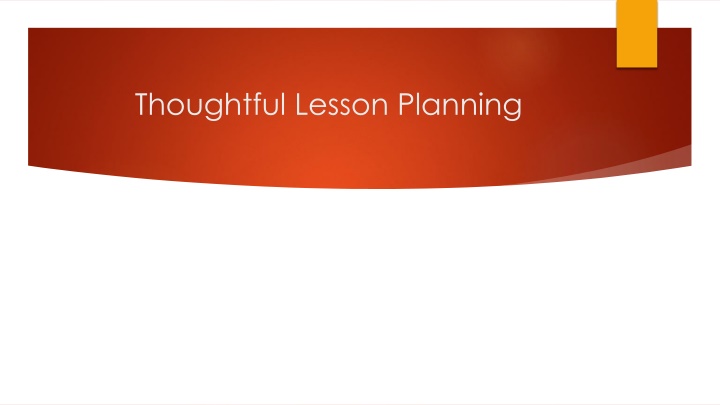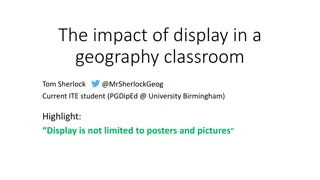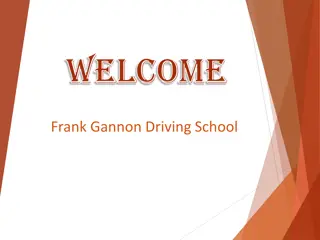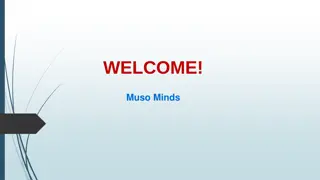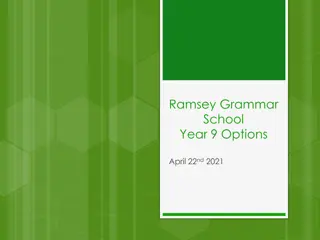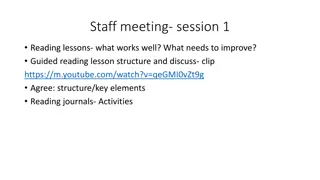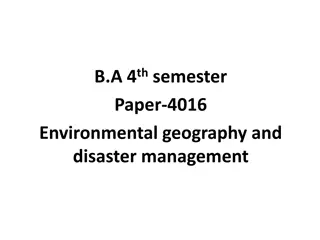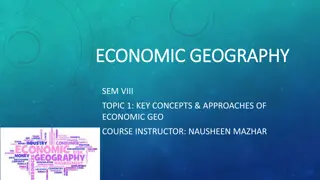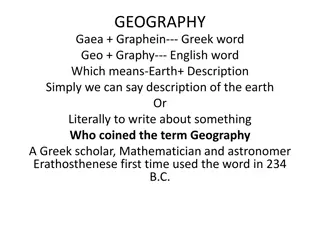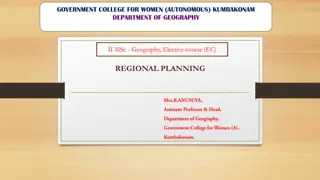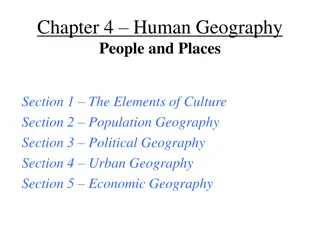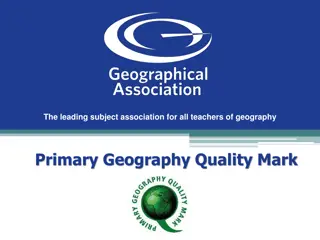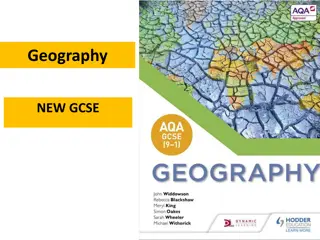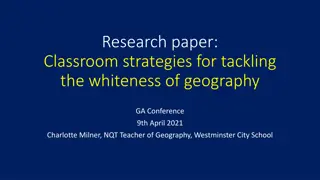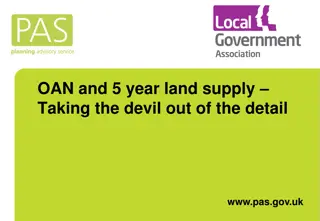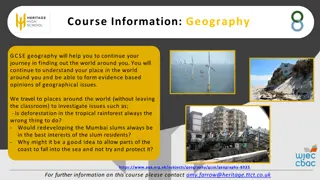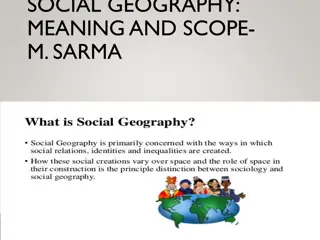Enhancing Geography Lessons Through Thoughtful Planning
Thoughtful lesson planning in geography education is essential for creating quality learning experiences. Student teachers need to merge subject knowledge with pedagogical skills to develop effective lesson plans that consider individual learners' needs. Challenges arise when lesson planning focuses more on technical aspects rather than the process itself, leading to potential gaps in student engagement with challenging geographical concepts. Emphasizing geography at the core of lesson planning helps ensure a holistic approach to teaching and learning.
Download Presentation

Please find below an Image/Link to download the presentation.
The content on the website is provided AS IS for your information and personal use only. It may not be sold, licensed, or shared on other websites without obtaining consent from the author.If you encounter any issues during the download, it is possible that the publisher has removed the file from their server.
You are allowed to download the files provided on this website for personal or commercial use, subject to the condition that they are used lawfully. All files are the property of their respective owners.
The content on the website is provided AS IS for your information and personal use only. It may not be sold, licensed, or shared on other websites without obtaining consent from the author.
E N D
Presentation Transcript
Assumptions A lesson plan s fundamental purpose is to create good quality geographical learning in the classroom. How student teachers are taught to approach their lesson planning has the potential to scaffold their construction of Pedagogical Content Knowledge (PCK), and thus their understanding of lesson planning as a complex worthwhile process. Whilst student teachers can develop their subject knowledge and pedagogical knowledge independently, important decisions merging the two with consideration of individual leaners needs guidance.
Shared concerns When considering lesson planning guidance for student teachers, Rusznyak and Walton start with the concern that lesson planning for student teachers is often regarded in technical terms, merely as the means to ensure effective classroom performance it is the product of the action of lesson planning that is emphasised, not the value of the process . Margaret Roberts working as a PGCE tutor observes that mentors have a tendency to focus on separate elements of the lesson rather than to consider lessons as a whole. Gert Biesta discusses the issues behind an Instrumentalist approach, where a lesson is regarded as successful if the learning objectives have been met regardless of whether or not pupils have been introduced to and engaged with challenging Geographical concepts.
Shared concerns Lambert in his article Reviewing the case for Geography, and the knowledge turn in the English National Curriculum in The Curriculum Journal states that teachers have turned away from knowledge and in my view have been encouraged to overinvest energy into Pedagogy and almost make a fetish out of learning . The Association of School and College Leaders 10 point plan to reduce teachers workload states that whilst lesson planning is important it should not be a bureaucratic process. The focus should be on impact rather than compliance.
The Issues Student teachers often; See the product of the lesson plan as the important thing rather than the process. Spend longer considering pedagogy than geographical content Consider pedagogy before geographical content Start the planning process by using the grid, seeing the lesson as separate elements. See lesson plans as unnecessary as they can annotate their resources Spend vast amounts of time filling in lesson plan grids
Putting Geography at the heart of lesson planning The starting point should be; What shall I teach and why is it worth knowing? How should I teach it? should be considered in relation to what is taught. Key concepts in geography should ground the lesson. 1. Space, Place and Environment. Herbert and Matthews 2. Space and Place, Scale and connection, proximity and distance and relational thinking. Peter Jackson Consideration of building geographical understanding. Making connections between different aspects of the topic through a regional or systematic approach.
The Process Revising the lesson plan process to include an informal thoughtful stage before completing the lesson plan template- Lesson planning Guidance. Inviting student teachers to engage with philosophical debates including; what is Education?, what is geography?, why should children learn geography?, What does progression mean in geography? and The geography curriculum: what to teach? Helping student teachers to make the connections between these debates and the lesson planning process. Student teachers using the new lesson planning guidance during placement 1. Reflecting on how the guidance has been used in placement 1 through; looking at examples of initial lesson plans (including the informal part), informal discussions with mentors in school and during mentor training, formal lesson observations by PGCE tutor, and student teachers reflections following lesson observations.
Lesson Planning Guidance Adapted from: Lee Rusznyak & Elizabeth Walton (2011) Lesson planning guidelines for student teachers: A scaffold for the development of pedagogical content knowledge, Education as Change 1. Find out the routine information for the class (Room, pupil data, resources etc.) 2. What is the purpose of the lesson? What geography do I want them to learn (Knowledge, understanding, skills and values or key questions)? What are the key concepts in geography that will be explored? 3. What is my understanding of the most important content knowledge? Explain the subject knowledge to be taught. 4. What are the individual needs that may influence how pupils understand the content knowledge? 5. What do pupils already know about this subject? (consider school and personal experiences) 6. What geography vocabulary will pupils learn in the lesson? 7. What misunderstandings/mistakes might pupils have/make? How could I overcome these? 8. What teaching and learning activities will best support the geography I want pupils to learn in the lesson? Justify the selection. 9. What resources will be needed in the lesson? 10. Write a step by step sequence of learning steps Now complete the short lesson plan template which will act as an aide- memoire during the lesson and should be placed in your Teaching Practice File.
Initial responses- positives Student teachers use the messy lesson plan much more freely and are happier to reconsider initial choices made. They used the questions to consider how to build geographical learning from a simplistic to a more complex understanding in pupils minds. They used the questions to consider how geographical ideas and concepts connected to one another. Some mentors reported that the consideration of what the student already understood in relation to subject knowledge was useful in identifying support prior to the lesson. Students with gaps in their subject knowledge used Q3 to ensure they had considered their own understanding before the lesson.
Initial responses- positives Some mentors reported that students were asking to see pupils books and questioned teachers (outside of geography too) about what the pupils already knew, so they could answer the guidance question. This was then used to inform planning. Some students used the guidance questions to structure observations prior to teaching a particular class. Pedagogical choices were always made after subject development had been considered. The strongest students were able to merge subject knowledge, pedagogical choices and knowledge of learners to develop PCK. Some students became professionally critical of the geographical worth of some elements of their department s curriculum. One mentor reported that they had been impressed that the student teacher had accurately predicted the misconceptions pupils might have and had built this into his planning.
Initial Responses- Negatives Some student teachers turned the guidance questions into a grid and viewed it as an extension of the lesson plan grid. Of these some ignored the deeper questions, seeing the product and practical elements as the most worthwhile parts of the lesson plan. Some students viewed the lesson plan grid as the most important formal document and stopped completing a messy lesson plan. Only stronger students justified the pedagogical decisions, others ignored this second element to Q8. Some students have started to use the messy lesson plan as a place to simply thrash out what they know about the topic as they find this useful.
Ways Forward Revisiting the lesson planning process with student teachers after SE1 to reinforce the importance of the process rather than the product. Return to the original debates from the start of the course, drawing on student teachers experiences in relation to them whilst on SE1. Develop student teachers understanding of Pedagogical Content Knowledge through literature, lesson evaluation and reflecting on session structure/planning process at university. Share examples of best practice, with student teachers verbal commentaries on how and why they have been successful.
References Gert Biesta (2007) Why what works won t work Educational Theory Journal, Vol 51 Issue 1. p1-22. Herbert, D and Matthews, J (2008) Geography: A very short introduction. Oxford: Oxford university press. Peter Jackson (2006) Thinking Geographically in geography, 91(3), pp199-204 David Lambert (2011) Reviewing the case for Geography, and the knowledge turn in the English National Curriculum, The Curriculum Journal Rice, R.E. (1992) 'Towards a broader conception of scholarship: the American context' in Whiston, T. and Geiger, R. (eds) Margaret Roberts (2011) What Makes a Geography Lesson Good? based on a lecture at the GA 2011 Annual Conference Lee Rusznyak & Elizabeth Walton (2011) Lesson planning guidelines for student teachers: A scaffold for the development of pedagogical content knowledge, Education as Change 15:2, 271-285, http://dx.doi.org/10.1080/16823206.2011.619141
